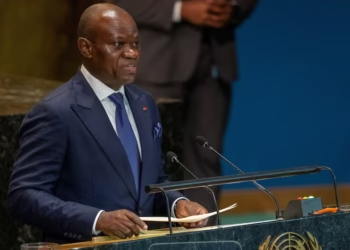Three years after defaulting on its foreign debt, Zambia finds itself mired in a protracted and challenging negotiation process with its creditors.
This financial quagmire has left the southern African nation in a state of development finance limbo, hindering its ability to raise essential funds for job creation, infrastructure development, and the provision of crucial services such as health and education, all while grappling with the impacts of climate change.
President Hakainde Hichilema has sounded the alarm, warning that this situation poses a serious threat to Zambia’s democracy. Despite concerted efforts, Zambia has faced obstacles in reaching a comprehensive agreement with its creditors. The country serves as a test case for the Common Framework established by the G20 international forum in November 2020 to address the debts of low-income countries. Unfortunately, Zambia’s experience exposes the shortcomings of the Common Framework, as it has struggled to deliver the expected results.
The International Monetary Fund (IMF), tasked with assisting countries in economic distress, has been limited in its ability to leverage the necessary resources and bargaining power to compel other creditors to engage in a sustainable debt deal with Zambia. The IMF’s contribution of US$1.3 billion over three years falls significantly short of Zambia’s financing gap of US$8.4 billion. Moreover, the conditions attached to the financing present tough choices and require sacrifices from the Zambian government and its people.
Zambia’s official creditors, organized into a committee chaired by China and France, have moved slowly, seemingly prioritizing agreements aligned with their geo-strategic interests rather than prioritizing Zambia’s best interests. In June 2023, an agreement on a common template for all official creditors was reached. However, the process of individual creditors reaching binding agreements with Zambia based on this template remains a work in progress.
In October 2023, Zambia announced an agreement with the holders of its US$3 billion worth of Eurobonds. While these creditors, with Zambia’s approval, claimed to be making a comparable contribution to the official creditors in resolving Zambia’s debt crisis, their deal faced rejection in November.
Zambia’s official creditors and independent experts argued that the commercial creditors were receiving more favorable treatment, resulting in a discrepancy of approximately 20 cents more for each dollar of outstanding debt compared to the official creditors. This setback means Zambia and its bondholders must now return to the negotiation table.
The current approach to sovereign debt restructuring is proving ineffective for Zambia and its people. There is a pressing need for a new approach that respects Zambia’s legal commitments to its creditors while prioritizing a sustainable and fair resolution to its debt crisis. As the global community grapples with the complexities of debt restructuring, Zambia’s case underscores the urgency of re-evaluating and reforming international frameworks to better serve the interests of indebted nations seeking a path to financial recovery.
Key Actions That Zambia Should Consider
Zambia should explicitly state its goal of achieving an optimal outcome to its debt crisis. This optimal outcome should consider the circumstances of all parties involved, taking into account economic, financial, environmental, social, human rights, and governance benefits. Emphasizing the need for monitoring the implementation of this outcome will ensure accountability.
By framing the negotiations in terms of optimal outcomes, Zambia challenges creditors to align restructuring terms with sustainable development goals and climate commitments. Zambia can leverage this position to negotiate terms that not only address its debt obligations but also contribute to broader national development objectives.
Zambia should publicly assert its commitment to fulfilling contractual obligations while emphasizing the importance of meeting Sustainable Development Goals (SDGs) and nationally determined contributions under climate agreements.
This strategic move forces creditors, especially official ones, to demonstrate how its proposed restructuring terms align with these global commitments. By holding creditors accountable to their expressed support for SDGs and human rights, Zambia can create a platform for transparent discussions that consider the broader implications of the debt restructuring process.
Zambia can leverage civil society organizations and international allies to engage with creditors through the designated national contact points under the OECD Guidelines. These contact points, present in many of Zambia’s official creditor countries, can facilitate dialogue between civil society, creditors, and the Zambian government.
By proposing discussions on how creditors can contribute to an optimal outcome, civil society can play a vital role in holding creditors accountable to international guidelines and principles, fostering transparency, and ensuring that the debt restructuring process considers social and human rights impacts.
Zambia should propose a consolidated negotiation forum where all creditors, including official creditors and bondholders, come together to discuss and make a comprehensive agreement addressing all debt obligations. While this may complicate negotiations, it enhances transparency and ensures comparable treatment for all creditors.
By bringing all stakeholders to the table simultaneously, Zambia can demand that creditors consider not only their contractual rights but also Zambia’s legal obligations to public servants, pensioners, international treaties, and constitutional commitments. This consolidated approach provides a holistic framework for negotiating a fair and sustainable debt resolution.
In navigating these strategies, Zambia can strengthen its position, ensuring that the debt restructuring process goes beyond immediate financial concerns and addresses the broader socio-economic and environmental goals crucial for the country’s long-term development.
READ ALSO: am George Laments Over Delay In The Passage of The Anti- LGTBG Bill





















